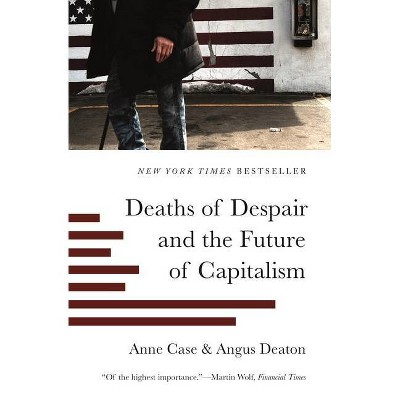Sponsored

The Future of Capitalism - by Paul Collier
Out of Stock
Sponsored
About this item
Highlights
- Bill Gates's Five Books for Summer Reading 2019From world-renowned economist Paul Collier, a candid diagnosis of the failures of capitalism and a pragmatic and realistic vision for how we can repair it.Deep new rifts are tearing apart the fabric of the United States and other Western societies: thriving cities versus rural counties, the highly skilled elite versus the less educated, wealthy versus developing countries.
- Author(s): Paul Collier
- 256 Pages
- Business + Money Management, Free Enterprise & Capitalism
Description
About the Book
"Originally published in the United Kingdom in 2018 by Allen Lane, an imprint of Penguin Random House UK"----Copyright page.Book Synopsis
Bill Gates's Five Books for Summer Reading 2019
From world-renowned economist Paul Collier, a candid diagnosis of the failures of capitalism and a pragmatic and realistic vision for how we can repair it.
Deep new rifts are tearing apart the fabric of the United States and other Western societies: thriving cities versus rural counties, the highly skilled elite versus the less educated, wealthy versus developing countries. As these divides deepen, we have lost the sense of ethical obligation to others that was crucial to the rise of post-war social democracy. So far these rifts have been answered only by the revivalist ideologies of populism and socialism, leading to the seismic upheavals of Trump, Brexit, and the return of the far-right in Germany. We have heard many critiques of capitalism but no one has laid out a realistic way to fix it, until now.
In a passionate and polemical book, celebrated economist Paul Collier outlines brilliantly original and ethical ways of healing these rifts--economic, social and cultural--with the cool head of pragmatism, rather than the fervor of ideological revivalism. He reveals how he has personally lived across these three divides, moving from working-class Sheffield to hyper-competitive Oxford, and working between Britain and Africa, and acknowledges some of the failings of his profession.
Drawing on his own solutions as well as ideas from some of the world's most distinguished social scientists, he shows us how to save capitalism from itself--and free ourselves from the intellectual baggage of the twentieth century.
From the Back Cover
From world-renowned economist Paul Collier, a candid diagnosis of the many failures of the greatest economic system in history, and a pragmatic and realistic vision for how we can repair it
Western society, once thriving, is being torn apart by deep new rifts in its social and economic fabric. It's now populous cities versus rural counties; the highly skilled elite versus the less educated; wealthy versus developing countries. As these breaks have deepened, we've lost the sense of obligation to others so crucial to the rise of postwar social democracy in the first place.
These divisions are currently being addressed solely by revivalist ideologies and populist megafigures -- we're in the age of Brexit, President Donald Trump, and the return of the far right in Germany. And unless we do something now, the gap between the promises of prosperity for all that capitalism once offered and the crisis of contempt we find ourselves in will only grow wider, faster.
The Future of Capitalism is a passionate and polemical treatise that presents brilliantly original solutions for healing this economic, social, and cultural discord, with the cool head of pragmatism and policy rather than the fervor of rhetoric. Paul Collier's workable solution is in the center: we have no time for moral or intellectual superiority on either side of the political spectrum, he argues, and no shiny new economic theory is going to save us this time.
Drawing on the wisdom of some of the world's most distinguished social scientists, Collier charts an agenda of empowerment to show us how to save capitalism from itself -- eschewing the ideological baggage of the twentieth century and instead crafting practical policy grounded in communitarian ethics to address the rapid rise in inequality that will either end us or propel us into an entirely new economic age.
Review Quotes
"Responding to recent electorate revolts in developed countries against paternalistic democratic policies, Collier explores the reasons for these events and suggests pragmatic remedies employing education, taxation, social services, and political reform. Collier's wide-ranging work presents challenging concepts from a British viewpoint, providing a meaningful perspective that will reward thoughtful readers. A noteworthy addition to works such as Douglas McWilliams's The Inequality Paradox and Thomas Piketty's Capital in the Twenty-First Century." - Library Journal
"These times are in desperate need of Paul Collier's insights. The Future of Capitalism restores common sense to our views of morality, as it also describes their critical role in what makes families, organizations, and nations work. It is the most revolutionary work of social science since Keynes. Let's hope it will also be the most influential." - George Akerlof
"Collier mounts a compelling and often scathingly witty last-ditch defense, seeking not to combine the "best ideas" of Left and Right, but to fix the damage they've done. His brand of pragmatism, or "the hard center," involves redistribution to the losers across three great divides -- urban vs. provincial; educated vs. not; globally rich vs. poor -- while preserving capitalism and national boundaries." - Vulture's Best New Books of December
" In this masterful blend of personal experience and the best thinking of diverse social scientists, economist Collier analyzes the current breakup of the 'cornerstones of belonging'--family, workplace, and nation--and the ensuing frustrations that have opened the way for populists and ideologues. He urges pragmatic policies to manage capitalism (which is 'not working' for many), rebuild the 'beleaguered center' of the political spectrum and restore the "ethics of community" to contemporary life." - Kirkus Reviews starred review
"An engaging and well-reasoned argument....There is nothing socialist about Collier's critique or his prescriptions -- like Adam Smith, the oft-misunderstood father of modern economics, he's about restoring a moral sensibility to a market system that is falling short of its potential." - Washington Post
"Responding to recent electorate revolts in developed countries against paternalistic democratic policies, Collier explores the reasons for these events and suggests pragmatic remedies employing education, taxation, social services, and political reform. Collier's wide-ranging work presents challenging concepts from a British viewpoint, providing a meaningful perspective that will reward thoughtful readers. A noteworthy addition to works such as Douglas McWilliams's The Inequality Paradox and Thomas Piketty's Capital in the Twenty-First Century." - Library Journal
"National loyalty, far from being inimical to a more just and decent world in which all, including the world's poorest, can flourish, is seen by Collier as a firmer foundation for global cooperation than abstract cosmopolitanism, which all too often serves as a mask for unenlightened self-interest. How does Collier intend to repair the bonds of affection in the rich democracies? The Future of Capitalism is rife with inventive proposals....his 'hard centrism' has much to offer." - New York Times Book Review
"An ambitious attempt to restate the aims of capitalism and social democracy." - Bloomberg News
"In this bold work of intellectual trespass, Paul Collier, a distinguished economist, ventures onto the terrain of ethics to explain what's gone wrong with capitalism and how to fix it. To heal the divide between metropolitan elites and the left-behind, he argues, we need to rediscover an ethic of belonging, patriotism, and reciprocity." - Michael J Sandel author of What Money Can't Buy and Justice
Shipping details
Return details
Frequently bought together
Trending Non-Fiction
















